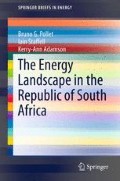Abstract
This Chapter highlights renewable energy developments and the various energy initiatives. It briefly discusses the international perspective on capacity shortages as well as the sources of economic damage.
Access this chapter
Tax calculation will be finalised at checkout
Purchases are for personal use only
References
Ram B (2006) Renewable energy development in Africa—challenges, opportunities, way forward. South Africa Regional Office, African Development Bank
Eberhard A, Kolker J, Leighland J (2014) South Africa’s renewable energy IPP procurement program: success factors and lessons, May 2014. http://www.gsb.uct.ac.za/files/PPIAFReport.pdf
UNEP (2012) Financing renewable energy in developing countries, drivers and barriers for private finance in sub-Saharan Africa, February 2012. http://www.unepfi.org/fileadmin/documents/Financing_Renewable_Energy_in_subSaharan_Africa.pdf
South African Department of Energy (DoE) (2013) More agreements signed for energy generation. http://www.sanews.gov.za/south-africa/more-agreements-signed-energy-generation
Creamer T (2014) Global renewables investors warn SA prices becoming ‘dangerously low’. Engineering news. http://tinyurl.com/qayey42
World Bank (2014) World Bank open data. http://data.worldbank.org/
Borel-Saladin JM, Turok IN (2013) The impact of the green economy on jobs in South Africa. S Afr J Sci 109(9/10), Art. #a0033, 4 pp. http://dx.doi.org/10.1590/sajs.2013/a0033
Maia J, Giordano T, Kelder N, Bardien G, Bodibe M, Du Plooy P, Jafta X, Jarvis D, Kruger-Cloete E, Kuhn G, Lepelle R, Makaulule L, Mosoma K, Neoh S, Netshitomboni N, Ngozo T, Swanepoel J (2011) Green jobs: an estimate of the direct employment potential of a greening South African economy. Industrial Development Corporation, Development Bank of Southern Africa, trade and industrial policy strategies. http://www.idc.co.za/projects/Greenjobs.pdf
DBSA (Development Bank of Southern Africa) (2014) Integrated annual report. http://issuu.com/developmentbankofsouthernafric/docs/dbsa_integrated_annual_report_2013
IRENA (International Renewable Energy Agency) (2013) Southern African power pool: planning and prospects for renewable energy. http://www.irena.org/DocumentDownloads/Publications/SAPP.pdf
National Climate Change Response White Paper (2013) Department of environmental affairs, navigant research. http://www.navigant.com/~/media/WWW/Site/Insights/Energy/Renewable%20Energy%20Quarterly%20Dialogue%201Q13.ashx
Royal Academy of Engineering (2014) Counting the cost: the economic and social costs of electricity shortfalls in the UK
Praktiknjo AJ, Hähnel A, Erdmann G (2011) Assessing energy supply security: outage costs in private households. Energy Policy 39:7825–8833
Adenikinju AF (2003) Electric infrastructure failures in Nigeria: a survey-based analysis of the costs and adjustment responses. Energy Policy 31:1519–1530
Electricity Consumers Resource Council (2004) The economic impacts of the August 2003 blackout. Electricity Consumers, Washington DC
Bloomberg Business (2015) South African power outages hurt economy as unemployment climbs. http://tinyurl.com/q6o8oy5
Amobi MC (2007) Deregulating the electricity industry in Nigeria: lessons from the British reform. Socio-Econ Plann Sci 41:291–304
USAID (1988) Power shortages in developing countries: magnitude, impacts, solutions, and the role of the private sector
Kessides C (1992) The contributions of infrastructure to economic development: a review of experience and policy implications. World Bank Discussion Paper 213
Andersen TB, Dalgaard CJ (2013) Power outages and economic growth in Africa. Energy Econ 38:19–23
Weare C (2003) The California electricity crisis: causes and options. Public Policy Institute of California, San Francisco
Cambridge Energy Research Associates (2001) Short circuit: will the California energy crisis derail the state’s economy?. UCLA, Los Angeles
Ministry of Economy, Trade and Industry (2011) Economic impact of the Great East Japan earthquake and current status of recovery, Tokyo
Swedish Agency For Growth Policy Analysis (2011) Restarting Japan: a first assessment June 2011 on the road to recovery after the Great East Japan earthquake. Working paper 2011/15
Author information
Authors and Affiliations
Corresponding author
Rights and permissions
Copyright information
© 2016 The Author(s)
About this chapter
Cite this chapter
Pollet, B.G., Staffell, I., Adamson, KA. (2016). Structure of the Energy Sector in South Africa. In: The Energy Landscape in the Republic of South Africa. SpringerBriefs in Energy. Springer, Cham. https://doi.org/10.1007/978-3-319-25510-1_5
Download citation
DOI: https://doi.org/10.1007/978-3-319-25510-1_5
Published:
Publisher Name: Springer, Cham
Print ISBN: 978-3-319-25508-8
Online ISBN: 978-3-319-25510-1
eBook Packages: EnergyEnergy (R0)

